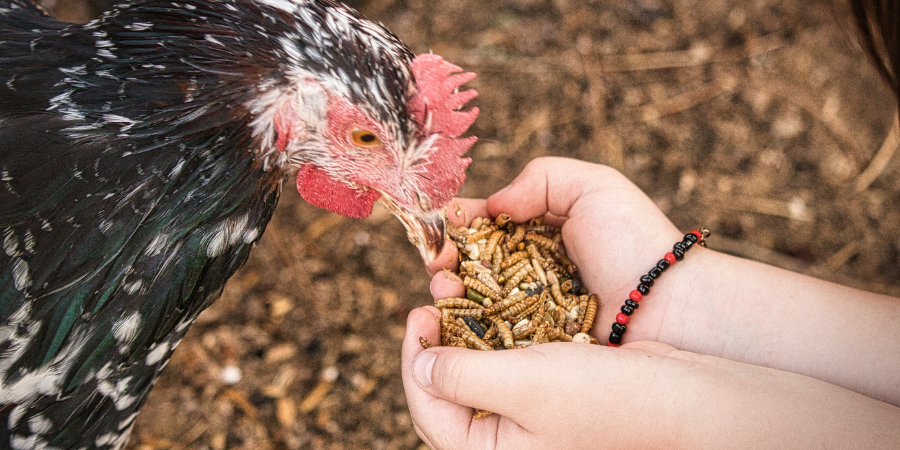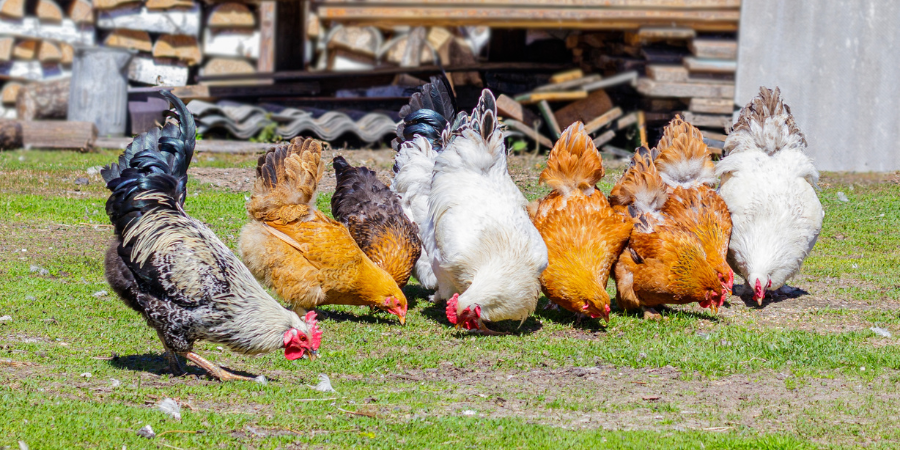Lost on What to Feed Chickens or Laying Hens? Raising Chickens Guide
by Dakota Storage Buildings, on June 19, 2023

When you begin raising backyard chickens, you will likely end up researching the different breeds, how many chicks you should get, and the different styles of coops. One often overlooked yet essential aspect of raising chickens is the type of feed your birds will need. When you give them the right feed, it will result in happy, healthy chickens. However, when their feed is inadequate, it can adversely affect their health. Here, we will cover the basic requirements of every chicken feed and more so you can determine what is best for your flock.
Know What Your Chickens Need
Knowing what type of chicken feed your birds need is one of the most important parts of your job as someone who raises chickens. This topic plays a crucial role in the health and happiness of your birds. When the feed does not have the proper nutrients, your chickens can have problems laying eggs or developing as they need to. Investing in age-appropriate feed is one of the best ways to care for your chickens. With so many different options available, knowing which type of feed your flock needs can take a lot of work. Plus, the jargon vocabulary can make it even more confusing. In this blog, we hope to break down all the essential topics and terms so you can better understand and find the best feed for your birds.
The Right Feed For Your Flock
Did you know that the purpose of your flock can directly impact the type of feed they need? Picking up a random feed bag may be easy, but your flock could miss out on essential nutrients. Meat birds and egg-laying flocks require very different types of feed. Meat birds need a ton of protein, specifically 22 to 24% of their diet, to keep up with their high-speed development. While egg-laying birds also need protein, the required amount is substantially less than meat birds. Feeding your flock the wrong feed could have dire consequences on their egg production and overall health. Research has shown that all birds need protein, amino acids, vitamins, enzymes, and fiber for a balanced diet. Next time you go to the store, inspect the labels to ensure everything is present and present on this list.
Laying Hens vs. Non-laying
Once your chicks have grown into adults and begun laying eggs, it is time to switch up their feed. Layer feed is essential once your hen has laid her first egg. This feed consists of around 16% protein and has fewer vitamins than the feed they used. However, gradually introducing this feed into their diet can ensure they have all the necessary nutrients to produce quality eggs. Layer feed has more nutrients, so this rich food increases the overall egg quality. Once you introduce your hens to layer feed, it will take up the majority of their diet.
Non-laying chickens will never be switched to layer feed. For these birds, the simple, basic feed you have been using up until now will continue to provide all the nutrients they need. Remember that chickens eat to get the nutrients their bodies crave. Finding nutrient-rich feed will ensure less feed is wasted and your flock remains healthy.

Feed Terms
When you buy chicken feed for the first time, there may be a lot of terms that you are unfamiliar with. The poultry feed industry is unique, and as a result, there are also unique terms. To help you know what exactly you are purchasing, eliminate confusion, and help find the type of feed that will be best for your flock, we put together this list of terms every chicken owner should know.
Pellets: Chicken feed can often be wasted and difficult for the birds to eat. By making them into pellets, it makes eating easier and ensures that waste is limited.
Crumbles: Chicks cannot eat the normal-sized pellet, so they are broken down even smaller to create crumbles. This helps chicks eat their food easier.
Mash: Unprocessed feed is considered mash. Mash is a powder-like substance because the feed particles are so tiny that they can be fed to both adult chickens and chicks.
Fermented: When mixed with water, chicken feed is allowed to ferment. The feed can naturally ferment when water is added and is a healthy option for your flock.
Medicated: Coccidiostat is a chemical that can help destroy protozoa. The medicated feed has been treated with this chemical to help chicks with coccidian protozoa.
Making Your Feed
Some homesteaders prefer mixing and creating their chicken feed. While it may be an attractive option, we recommend that beginners stick to store-bought feed first. This will help you learn exactly what nutrients your chickens need during different phases of their life. However, if you understand their diet requirements, mixing your feed can be a fun undertaking. To create a homemade feed, you will need to invest in additional equipment and have a way to acquire the individual ingredients. Getting started may take longer than expected, so be prepared to keep feeding your flock store-bought feed until you have perfected the homemade mix. Determining what to feed chickens does not have to be complicated, so do not make it harder on yourself.
The Chicken Feeder
Chicken feeders can be simple but should provide your chickens with adequate feeding space. Feeders protect your chicken’s meal from weather and fecal contamination, so you can be assured that their food is always fresh. You can choose from numerous different kinds, but two of the most common are gravity feeders and automatic feeders. Gravity feeders are cylinders that release feed into an attached tray as needed. Automatic feeders operate on a treadle basis. When a chicken steps on the plate, the top of the trough will open, and chickens can eat as they please. Both feeders are great options but have different benefits. Choosing one that works best for your flock and your schedule is imperative.
Ready to Raise Your Own Flock?
There are so many different aspects to raising chickens. From choosing the right chicken breed to keeping your flock healthy, there are numerous things you need to research before getting your chicks. If you are ready to take the next step, we created a free resource that you can use to find answers to all your burning questions. Chickens may be easy to raise, but you must understand their needs first. Ensure you are prepared for your flock by downloading your copy of The Beginners Guide to Getting Backyard Chickens today!

























